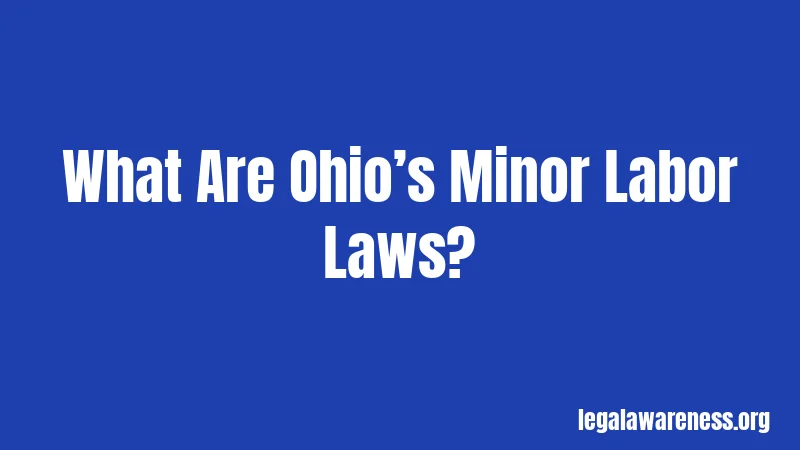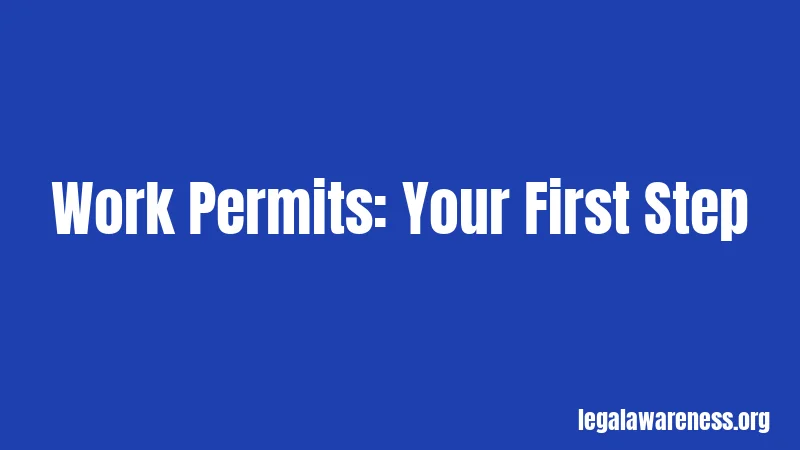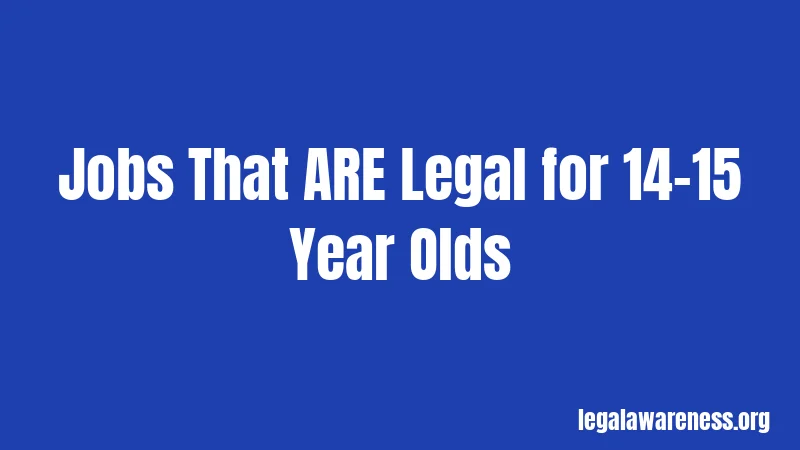Ohio Labor Laws for Minors (2026): Your Complete Working Guide
If you’re a teen in Ohio looking to get your first job, your parents wondering about work rules, or an employer hiring young workers—stay with me here. The laws around teen employment are stricter than most people realize. And if you get them wrong, the consequences can be serious.
Let me break down exactly what Ohio allows, what it doesn’t, and what you need to know before your first day of work.
What Are Ohio’s Minor Labor Laws?

Pretty straightforward: Ohio’s minor labor laws protect young workers from being exploited or put in dangerous situations. These laws set limits on hours, restrict certain jobs, and require specific paperwork before you can even start working.
Think of it like this. The state says: “Yes, teens can work.” But also: “But here’s how we’re going to protect them while they do.”
Age Requirements to Work in Ohio
Can a 13-year-old work? Basically, no. Not officially.
The minimum age to work in Ohio is 14 years old. If you’re younger than that, there are only a few exceptions. These include babysitting, delivering newspapers, working in a family business, or performing (like acting or modeling). But regular jobs? You need to wait until you’re 14.
Once you hit 14, doors open up. You can legally work in Ohio. But there are strings attached.
Work Permits: Your First Step

Here’s what most teens and parents don’t know: you can’t just show up to work. You need a work permit first.
If you’re 14 to 17 years old, a work permit is mandatory. This isn’t optional. It’s the law.
Your work permit comes from your school. You’ll probably talk to your guidance counselor or school administrator about getting one. They’ll verify a few things:
Your birth certificate to confirm your age. Proof that you’re enrolled in school. Your parents’ permission (and their signature).
After that, you get an official work permit. Then you give it to your employer before your first shift. Employers need to keep all of this on file.
And here’s the thing—this process exists to protect you. Not to annoy you.
The Jobs You CAN’T Do (If You’re Under 16)
Okay, this is important. There are a lot of jobs off-limits for kids under 16. And honestly, most of them make sense once you learn why.
You cannot work in:
Manufacturing, mining, or processing. Think factories and plants. All construction and repair work. That includes demolition and wrecking. Work with heavy machinery. This includes power-driven food slicers, woodworking machines, and metal-forming equipment. Transportation jobs. Bus drivers? Truck drivers? Nope. Not yet.
Banking or storing explosives. Working in freezers or meat coolers (though wrapping and labeling meat is okay). Window washing from heights like scaffolding or ladders. Boiler rooms or engine rooms. Logging and sawmilling. Loading and unloading trucks or warehouse work (except office jobs).
Some of these restrictions sound scary because they are. They’re preventing kids from losing fingers in machinery or getting hurt on construction sites.
Not sure if your job fits the rules? Let me break it down further.
Jobs That ARE Legal for 14-15 Year Olds

So what CAN you do? Plenty, actually.
Retail jobs work. Grocery stores, clothing shops, fast-food restaurants (with restrictions on what you can do). Office work. Filing, data entry, basic clerical stuff. Babysitting and childcare (sometimes). Lawn care and yard work. Delivering newspapers or flyers. Working in libraries or community centers. Some farm work (depending on the type).
The key rule is simple: if it doesn’t involve machinery, hazardous chemicals, heights, or heavy physical work, you probably can do it.
Working Hours: The Time Restrictions
This is where teens get tripped up. Ohio has strict rules about when you can work. And these rules change depending on whether school is in session.
For 14 and 15 Year Olds:
During the school year, you can work a maximum of 3 hours per day. So if you work Monday, Tuesday, and Wednesday, that’s 9 hours total for the week. Maximum of 18 hours per week while school is happening.
You can’t work before 7 a.m. on school days. At night, it depends on the time of year. From June 1 to September 1, or during any school holiday that’s 5 days or longer, you can work until 9 p.m. The rest of the year, you can only work until 7 p.m.
When school is not in session, the hours open up. You can work 8 hours per day and up to 40 hours per week. But you still can’t work before 7 a.m. or after 9 p.m.
For 16 and 17 Year Olds:
You get more freedom. No limits on how many hours you can work per week. But there are still time restrictions.
On days when school is in session, you can’t work before 7 a.m. (or 6 a.m. if you didn’t work after 8 p.m. the night before). You also can’t work after 11 p.m. on nights before school days.
When school is not in session? No restrictions. You could theoretically work all day and all night. But most employers won’t do that anyway.
Confused about how this applies to you? Your employer should have a calendar. They should know exactly when your school is in session and adjust accordingly.
Door-to-Door Sales (Extra Strict Rules)
Here’s something specific that trips people up: door-to-door sales have their own rules. These are stricter than regular jobs.
If you’re under 16 and want to sell stuff door-to-door (like candy, magazines, or cleaning products), your employer needs to be registered with the Ohio Department of Commerce. Not all employers are. A lot of them aren’t.
Your employer also has to provide supervision. For every six teen employees, there needs to be at least one supervisor who’s 18 or older. You have to work in pairs. Never alone. You need a special photo ID card from your employer.
And the hours are tighter. You can’t work before 7 a.m. or after 7 p.m. if you’re under 16. If you’re 16 or 17, you can work until 8 p.m.
This restriction exists because door-to-door work can put teens in unsafe situations. Working alone or in unfamiliar neighborhoods? Not allowed.
Minimum Wage in Ohio
Your employer needs to pay you fairly. No exceptions.
As of January 1, 2025, Ohio’s minimum wage is $10.70 per hour for most jobs. If you’re a tipped employee (like a restaurant server), the minimum wage is $5.35 per hour, but you’re supposed to earn tips on top of that.
And here’s something important: your employer cannot take illegal deductions from your paycheck. They can’t deduct money for “breaking stuff” or “not following rules” or “negligence.” Those deductions are illegal. Period.
Rest Periods and Breaks
Your employer has to give you breaks. Legally.
If you work more than 5 consecutive hours, you must get at least a 30-minute rest period. This usually means a lunch break or snack break. But it has to be written into your work day.
Your employer should also keep detailed time records showing when you started, when you stopped, and when your breaks were. They have to keep these records for at least 2 years. It’s a protection for both of you.
Hazardous Jobs: What About Ages 14-17?
Wait, it gets more complicated. There are jobs that NO teen under 18 can do. Not even 17-year-olds.
Even at 16 or 17, you cannot work in:
Slaughtering or meat-packing plants. Jobs involving explosives. Occupations with radioactive substances. Coal mining or any mining. Logging or sawmilling. Driving a car or truck as your main job. Roofing operations. Any job on a railroad. Maritime (ocean/water) work. Demolition or wrecking operations.
These aren’t limits because we think you’re weak or irresponsible. These are limits because these jobs kill people. Experienced adults have trouble with them safely.
Getting Paid: Wages and Fair Treatment
Your employer has to give you a written wage agreement before you start. This agreement should spell out:
How much you’ll be paid per hour, per day, per week, or per project. When you’ll get paid. What day your paycheck arrives. Whether you get overtime pay (you shouldn’t need it, since hour limits apply).
This agreement needs to be signed by both you and your employer. It’s not a casual thing. It’s a legal document.
Recent Changes to Ohio Labor Law
Okay, here’s where things get interesting. Ohio’s been talking about changing the work hours for younger teens.
In early 2025, the Ohio Senate passed Senate Bill 30. This bill would allow 14 and 15-year-olds to work until 9 p.m. year-round, with their parents’ and school administrators’ permission. Right now, this bill hasn’t become law yet. It still needs to pass the Ohio House.
So what’s the current rule? 14 and 15-year-olds can work until 7 p.m. during the school year and until 9 p.m. during the summer and school holidays. This is what’s in effect right now in 2026.
There’s also discussion about stronger enforcement of child labor laws. The idea is that if a teen is falling asleep in class because of work, teachers would report it. It’s meant to catch employers who are breaking the rules.
Make sure you check the latest updates. Laws can change. Your school’s guidance office should have the current information.
Employer Responsibilities
Employers have a lot of legal obligations when they hire a teen. Knowing these helps you make sure your workplace is following the rules.
Your employer must:
Keep a list of all teen employees and post it somewhere visible at work. Keep detailed time records for at least 2 years. Provide a written wage agreement that you both sign. Give you a 30-minute break after every 5 hours of work. Only employ you in legal jobs for your age. Verify your age and work permit before hiring you. Pay you at least minimum wage. Not deduct illegal amounts from your paycheck.
If your employer isn’t doing these things, that’s a problem. A big one.
Penalties for Employers Breaking the Law
What happens if an employer breaks these rules? The consequences are serious.
Employers can face minor misdemeanors for first-time violations. These might include small fines. But repeated violations? Those escalate quickly.
A misdemeanor offense happens when an employer keeps breaking the law. Every day they continue the violation counts as a separate offense. So if an employer keeps you past 7 p.m. for a week, that’s seven separate violations.
For serious violations—like employing a 14-year-old in construction or on heavy machinery—employers can face felony charges. That means jail time and much larger fines.
The Ohio Department of Commerce enforces these laws. They have investigators who can check records, interview employees, and take action against employers who break the rules.
Bottom line: most employers know the laws and follow them. But some don’t. And when they don’t, they face real consequences.
What Happens If You Need to Work
Maybe you need to work. Maybe your family needs the income. Maybe you want extra spending money. Whatever your reason, make sure you’re doing it legally.
Here’s what you need to do:
Get your work permit from your school first. Find a legal job for your age. Make sure your employer isn’t asking you to do something illegal. Get a written wage agreement signed by both you and your employer. Understand your hours and make sure they don’t conflict with school. Keep track of your hours and pay. Report any problems to your parents or a trusted adult.
If your employer asks you to do something that doesn’t feel right, trust that instinct. Talk to a parent, a teacher, or call the Ohio Department of Commerce.
Special Cases and Exceptions
Farm work has some different rules. If you’re working on a farm your family owns or operates, some restrictions don’t apply. Agricultural work by 14 and 15-year-olds can be okay depending on the type of work and whether you’ve had training.
Entertainment work (acting, modeling, dancing) also has different rules. These jobs are evaluated case-by-case.
Nonprofit work is exempt if you’re not being paid. So if you volunteer at a charity, the work-hour restrictions don’t apply. But if you’re getting paid, the rules apply.
Work in seasonal amusement parks and recreational places might have different requirements too. If you’re 16 or 17 and working at a summer amusement park, you might not need a work permit (check with your school administrator first).
Frequently Asked Questions
Can I work during school hours?
Not legally. Ohio law prohibits minors from working during school hours, with rare exceptions. If school is in session, you can’t be at work. This is one of the strictest rules because education comes first.
What if my employer asks me to work more hours than the law allows?
Say no. It’s illegal. Your employer could face serious consequences. If they keep asking, tell your parents or contact the Ohio Department of Commerce at 614-644-2239.
Do I need a work permit if I’m 16 or 17?
Yes, unless you work for a seasonal amusement park (and even then, check with your school). Minors aged 14-17 need work permits. There are almost no exceptions.
What if my employer won’t give me my paycheck on time?
That’s wage theft. It’s illegal. Report it to your parents immediately and contact the Ohio Department of Commerce or a labor attorney.
Can my employer make illegal deductions from my paycheck?
No. Illegal deductions include money for “breaking stuff,” not following rules, or performing poorly. Your employer can deduct taxes, Social Security, and court-ordered support. But not much else without your written permission.
What’s the difference between an “age certificate” and a “work permit”?
In Ohio, you need a work permit, not an age certificate. The work permit proves you’re old enough to work and that your school approves it. It’s different from just showing proof of age.
Can I work if I’m homeschooled?
Yes, with a work permit from your district superintendent instead of a school counselor. The rules are the same.
How to Report Violations
If you’re being treated unfairly or your employer is breaking the law, you have options.
Contact the Ohio Department of Commerce:
Phone: 614-644-2239 TTY/TDD: 800-750-0750 Address: Division of Industrial Compliance & Labor, 6606 Tussing Road, Reynoldsburg, OH 43068 Website: www.com.ohio.gov
You can also talk to a school counselor, teacher, or parent. They can help you figure out what to do next.
If the violation is serious—like wage theft or dangerous working conditions—you might want to consult with an employment lawyer. Many offer free initial consultations.
Final Thoughts
Working as a teen in Ohio comes with real protections. These laws exist because of history. In the 1800s, kids worked in mines and factories for 12+ hours a day. People fought to change that.
Now you have rules that protect your education, your safety, and your paycheck. That’s a good thing.
But these protections only work if employers follow them and if you know your rights. So read through this again if you need to. Bookmark it. Show your parents. Ask your school’s guidance office questions.
Most employers are good people trying to follow the rules. But some aren’t. Don’t let yourself become one of the exceptions. Stay informed, stay safe, and when in doubt, ask or look it up.
References
Ohio Revised Code Chapter 4109 – Employment of Minors
Ohio Department of Commerce – Minor Labor Laws Poster
Ohio Department of Commerce – Division of Industrial Compliance & Labor
